Wall Art Market Research, 2031
The global wall art market size was valued at $20.40 billion in 2021, and is projected to reach $34.77 billion by 2031, growing at a CAGR of 5.6% from 2022 to 2031.Any social setting benefits greatly from having wall art because it spreads the art to many different genres at once. Since not all artists can afford the scale and price of wall paintings, the sponsors that organize these exhibition programs generally provide these sponsorships on behalf of the government or powerful manufacturers. The painters receive a good fee from these sponsors. People's daily life where they live and work are directly impacted by wall paintings. With the advent of globalization, consumers can now easily find and use the decorative items, designs, and concepts. The need for such items is becoming more and more apparent to homeowners, who frequently look for them to keep their homes prettier and more appealing.
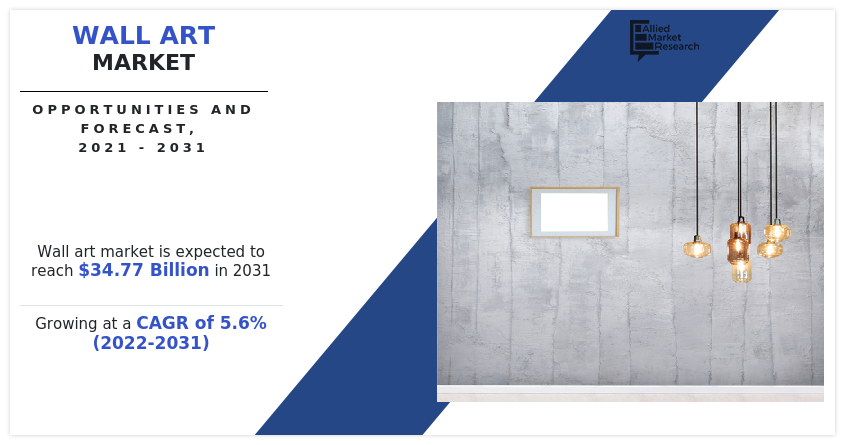
The market for wall art is expanding robustly, propelled by rising disposable incomes, a rebound in the real estate sector, rising urbanization rates, and rising awareness levels. An increasing number of new households are being established as a result of rising levels of urbanization. A favorable effect on the market for wall art will result from the fact that more than half of the world's population currently resides in urban areas, and that number is anticipated to rise even more in the upcoming years. The robust success of the online retail industry is a significant additional driver of this market. Since the emergence of online shopping, buying wall art is now simple, economical, and convenient.
The global wall art market is segmented into type, price point, sales channel, and region. By type, the market is divided into modern, abstract, and others. By price point, it is classified into premium and mass. By sales channel, the market is divided into auction houses, specialty stores, e-commerce, and others. Region wise, the market is analyzed across North America, Europe, Asia-Pacific, and LAMEA.
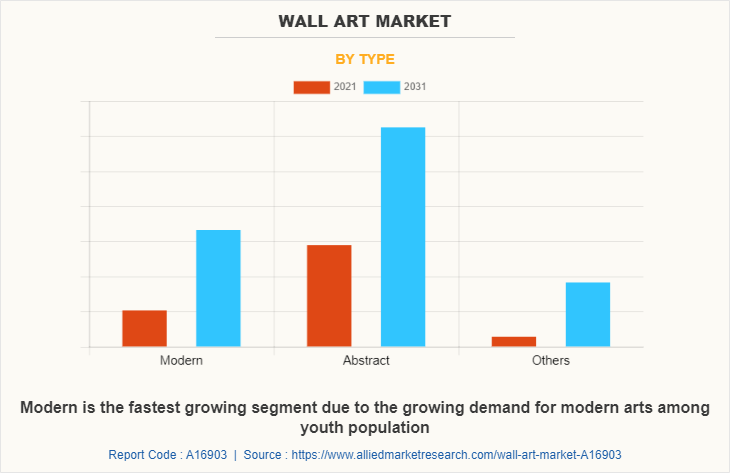
The abstract segment dominates the global market. Shapes, colors, forms, and gestural marks are used in abstract art instead of trying to accurately depict a particular aspect of visual reality in order to create its desired effect.
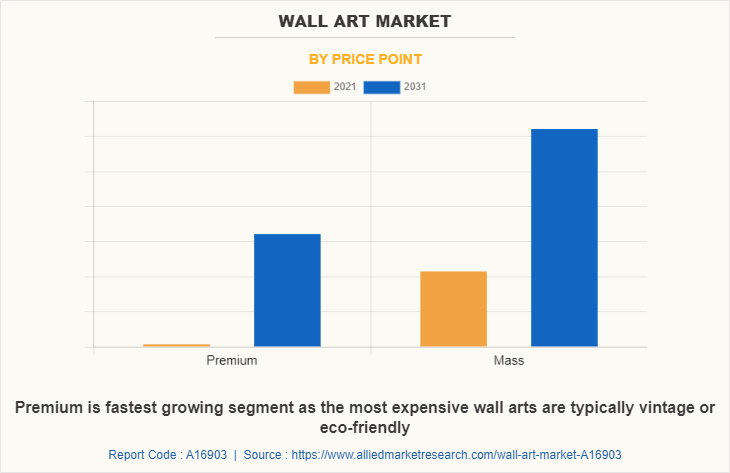
The mass segment dominates the global market. Increase in consumption of mass pricing products by lower middle and upper middle-class consumers significantly contributes toward the wall art market growth.
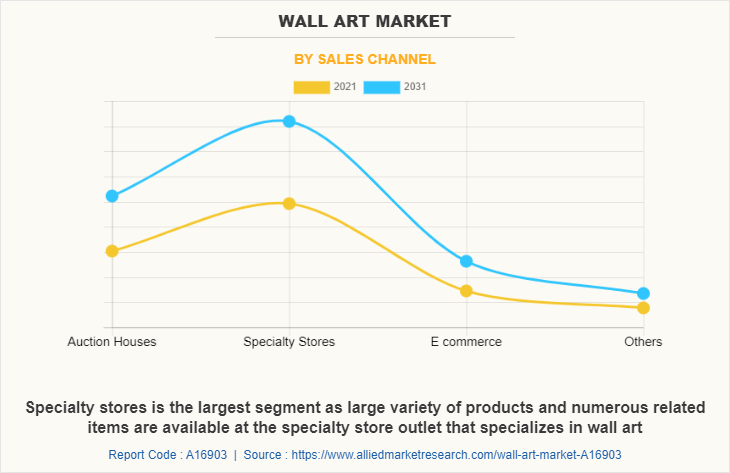
The specialty stores were the most significant segment, accounting for the highest wall art market share in 2021, according to the projection for the global market for wall art. However, due to increased internet usage and rising smartphone use for online shopping, the e-commerce segment is anticipated to experience the highest growth over the course of the forecast period. This is because these factors enable consumers to compare products in real time and make informed decisions.
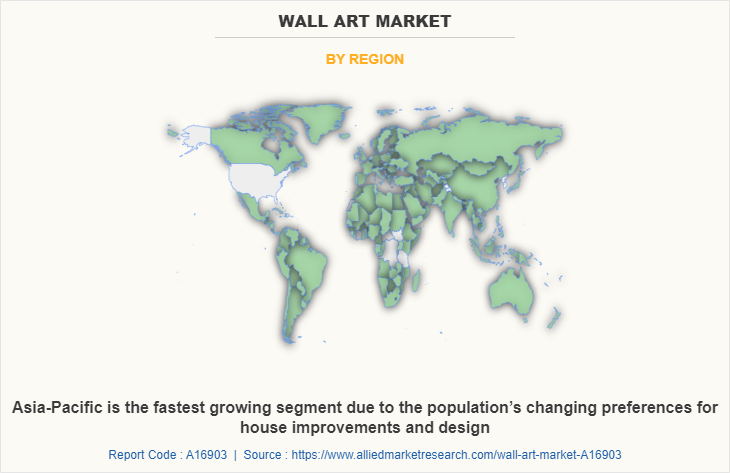
Due to its highly developed retail infrastructure, North America held the global market share for wall art in 2021. Due to the expansion of the construction industry in emerging economies like the U.S., Mexico, and Canada, it will continue to be the ruling region and have significant growth in the next years. The nation's market will grow as a result of the construction industry's quick pace of development in the information technology sector. The main driving forces in this area are the rapid alteration of individual behavior and lifestyle, as well as the embrace of western culture and architecture and rising personal spending.
The market expansion is driven to substantial government spending on infrastructure projects in developing nations like India, Malaysia, and Indonesia. As consumer preferences have changed, more people are choosing to purchase fully furnished houses, which has increased the need for wall decor products. Our houses now unavoidably include wall art. Additionally, consumers are now prepared to spend more to maintain the attractiveness and design of their houses. Corporate entities are also spending money on wall decor items to improve comfort and provide aesthetic value.
Porter's five forces analysis for the market highlights market competition in terms of the power of buyers, suppliers, manufacturers, and new entrants. Furthermore, shift in living standards of the consumers, as well as an increase in per capita income of the consumers has resulted in the launch of new products and the entry of new players in the market over the wall art market forecast period.
The growing demand for interior design services has an effect on the wall art business as well. The rise of the market will be positively impacted by the higher rate at which the interior design service business is growing. The wall art market demand will rise due to the interior design and refurbishment of historic buildings in developed countries like the U.S., France, Germany, the UK, and others to make the wall look more appealing.
Customers can truly personalize their homes through their decor choices thanks to the retail home furnishings industry. Because there is less of a need to remodel and redesign homes during lean economic times, the demand for home furnishings is cyclical and affected by housing starts. Consumer income influences demand as well. Large businesses compete through bulk purchasing, product variety, and proficient marketing and merchandising. Small businesses target a specific market segment and compete by offering a wide range of products and offering exceptional customer service.
The major players analyzed for the wall art industry are Etsy, Society 6, Saatchi art, 1000 Museums, Paintru, Artfinder, Redbubble, Schoolhouse, Urban Outfitters, Rifle Paperco, One Kings Lane, Big Wall Decor, Wayfair, Z Gallerie, and Art.com.
Key Benefits For Stakeholders
- This report provides a quantitative analysis of the market segments, current trends, estimations, and dynamics of the wall art market analysis from 2021 to 2031 to identify the prevailing wall art market opportunities.
- The market research is offered along with information related to key drivers, restraints, and opportunities.
- Porter's five forces analysis highlights the potency of buyers and suppliers to enable stakeholders make profit-oriented business decisions and strengthen their supplier-buyer network.
- In-depth analysis of the wall art market segmentation assists to determine the prevailing market opportunities.
- Major countries in each region are mapped according to their revenue contribution to the global market.
- Market player positioning facilitates benchmarking and provides a clear understanding of the present position of the market players.
- The report includes the analysis of the regional as well as global wall art market trends, key players, market segments, application areas, and market growth strategies.
Wall Art Market Report Highlights
| Aspects | Details |
| By Type |
|
| By Price Point |
|
| By Sales Channel |
|
| By Region |
|
| Key Market Players | Saatchi art, 1000 museums, Red bubble, Wayfair, Society 6, Paintru, Z gallerie, One kings lane, Etsy, Minted, Artfinder, Art.com |
Analyst Review
According to CXOs of leading companies, rising interest in giving homes and offices an aesthetic look, increasing demand for wall art from the construction industry to provide furnished and ready-to-live homes, increasing applications of décor in spas, salons, restaurants, and other establishments, rising preferences for the use of customized decorative products, and increasing demand for specific design of decoration are some of the significant and essential factors that will likely accelerate the growth of the wall art market. On the other hand, growing adoption of smartphones and internet portals, together with the prevalence of better sales channels, would further contribute by producing enormous chances that will led to the rise of the wall art market during the forecast period.
Another major driver of the demand for wall art is rising consumer disposable income. High-paying customers rarely give such purchases for their homes much thought. The changing tastes and preferences of customers as well as their changing lifestyles are contributing to this rise in demand for wall art. Additionally, the real estate market in developed nations like the U.S., Germany, the UK, and France, among others, has seen a considerable uptick in recent years, which is fueling demand for home lifestyle items like wall art. Another element boosting demand for wall art is GDP growth in developed nations.
The global wall art market size was valued at $20,401.3 million in 2021, and is projected to reach $34,770.8 million by 2031, registering a CAGR of 5.6% from 2022 to 2031.
The forecast period in the wall art market report is 2022 to 2031.
The base year calculated in the wall art market report is 2021.
The abstract segment is the most influential segment in the wall art market report.
North America holds the maximum market share of the wall art market.
The top companies analyzed for global wall art market report are Etsy, Society 6, Saatchi art, 1000 Museums, Paintru, Artfinder, Redbubble, Schoolhouse, Urban Outfitters, Rifle Paperco, One Kings Lane, Big Wall Decor, Wayfair, Z Gallerie, and Art.com.
The company profile has been selected on the basis of key developments such as partnership, product launch, merger and acquisition.
The market value of the wall art market in 2021 was $20,401.3 million.
Loading Table Of Content...



